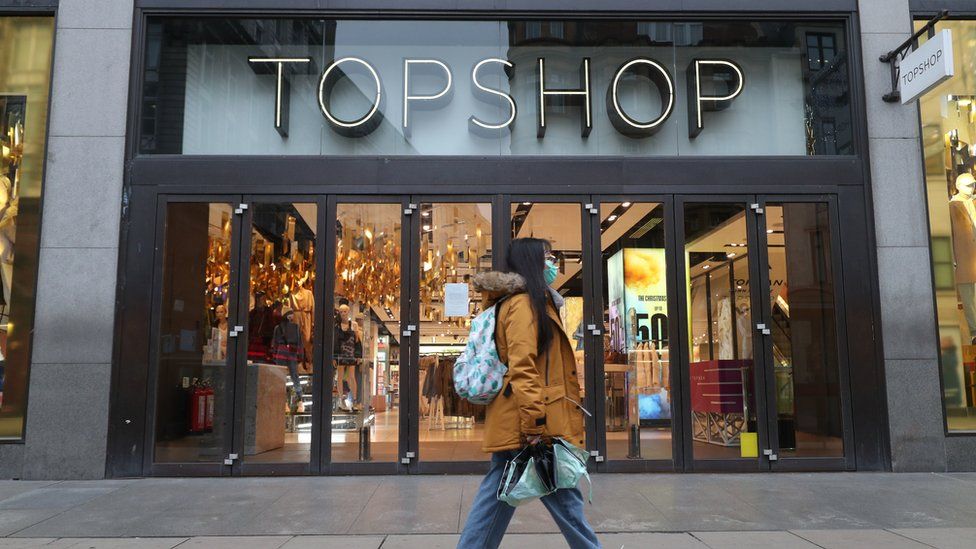
Online fashion retailer Asos has bought the Topshop, Topman, Miss Selfridge and HIIT brands from failed retail group Arcadia in a deal worth £295m.
Sir Philip Green's Arcadia group fell into administration in November last year, casting doubt over the future of its brands and 13,000 jobs.
Asos is acquiring the stock and the brands. However, it is not taking on the stores.
It is paying £265m for the brands and a further £30m for the stock.
Asos chief executive Nick Beighton said: "The acquisition of these iconic British brands is a hugely exciting moment for Asos and our customers and will help accelerate our multi-brand platform strategy.
"We have been central to driving their recent growth online and, under our ownership, we will develop them further, using our design, marketing, technology and logistics expertise, and working closely with key strategic retail partners in the UK and around the world."
Investment plans
Administrators for Arcadia confirmed the deal, saying about 300 people currently employed by the brands in design, buying and retail partnerships would transfer to Asos.
The administrators added that the deal was expected to complete on 4 February.
However, neither Asos nor the administrators made any mention of the people who worked in the brands' store networks.
It is thought that the deal puts about 2,500 jobs at risk.

Asos said it had acquired "strong consumer-facing brands" and saw "a significant opportunity" to drive further growth for them globally.
It added that the brands would benefit from "investment into customer engagement and brand positioning in line with our existing model".
Asos has seen strong sales in the pandemic and is already one of the biggest wholesalers for the brands that it has acquired.


Asos' purchase of the four main Arcadia brands leaves the thousands of staff employed in the Topshop, Topman, Miss Selfridge and HIIT shops facing a desperately uncertain future. They are unlikely to keep their jobs. It is hard to see a buyer emerging at the right time to keep them employed.
There are also 10,000 members of the Arcadia pension scheme who face a possible hit to their retirement benefits. The scheme has an estimated deficit of £350m and is being assessed by the Pension Protection Fund, the government-backed lifeboat scheme for orphan pension plans.
Council leaders all over the country will also be fretting at the rapid exodus from the High Street. Topshop once had 300 shops - only 70-odd are still operating - and Debenhams' 124 High Street stores are expected to close from next month. This is a double blow to town centres, which will now look much emptier when pandemic trading restrictions are lifted.
Landlords will be wondering who might be their new tenants. As one retail observer has noted, there is only so much street food and crazy golf that a single postcode can take. Many councils will hope a conversion of empty premises into flats will make the difference. However, the British Property Federation is warning that new government plans to fast-track the re-purposing of retail premises risk making matters worse.

Another of Sir Philip Green's brands, Evans, was bought by Australia's City Chic in December for £23m.
Other brands in the Arcadia stable that have not yet been sold are Dorothy Perkins, Wallis and Burton.
It emerged last week that online fashion retailer Boohoo was in "exclusive" talks to snap up those brands.
Also last week, Boohoo sealed a deal to buy the Debenhams brand and website for £55m. However, the price tag did not include any of the retailer's remaining 118 High Street stores or its workforce, resulting in up to 12,000 job losses.
Sir Philip Green is under pressure to use his own money to plug an estimated £350m hole in Arcadia's pension fund, which has about 10,000 members.
Last year, the retail tycoon had an estimated fortune of £930m, according to the Sunday Times Rich List.
Prof John Colley, associate dean of Warwick Business School, described the Asos deal as "another nail in the High Street's coffin",
"Meanwhile. landlords will have to try to re-let the properties and there will be few takers in the current climate," he said.
"With retail values collapsing, it is likely that many of these properties have to be converted for other uses. In that sense, we can see Covid-19 accelerating and crystallising trends which have been developing for many years."
https://news.google.com/__i/rss/rd/articles/CBMiLGh0dHBzOi8vd3d3LmJiYy5jby51ay9uZXdzL2J1c2luZXNzLTU1ODg0NTk20gEwaHR0cHM6Ly93d3cuYmJjLmNvLnVrL25ld3MvYW1wL2J1c2luZXNzLTU1ODg0NTk2?oc=5
2021-02-01 09:27:00Z
52781340626560
Tidak ada komentar:
Posting Komentar